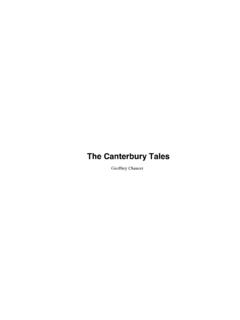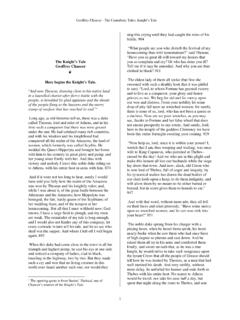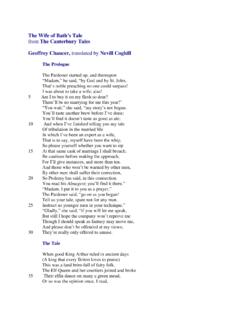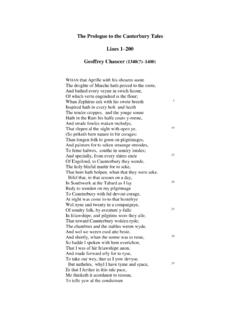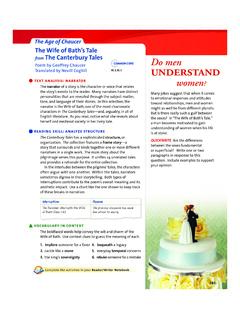Transcription of The Canterbury Tales - KUL
1 Geoffrey chaucer THE Canterbury TALEST ranslated into Modern English by Nevill CoghillContentsINTRODUCTION: chaucer s Life chaucer s WorksThe Canterbury Tales [GROUP A]THE PROLOGUETHE KNIGHT S TALEW ords between the Host and the MillerTHE MILLER S TALEThe Reeve s PrologueTHE REEVE S TALEThe Cook s PrologueTHE COOK S TALE[GROUP B]Introduction to the Man of Law s TaleThe Man of Law s PrologueTHE MAN OF LAW S TALEE pilogue to the Man of Law s TaleTHE SHIPMAN S TALEW ords of the Host to the Shipman and the PrioressThe Prioress s PrologueTHE PRIORESS S TALEW ords of the Host to ChaucerCHAUCER S TALE OF SIR TOPAZThe Host stops chaucer s Tale of Sir TopazCHAUCER S TALE OF MELIBEE (in synopsis)Words of the Host to the MonkTHE MONKS TALE(Lucifer, Adam, Samson, Hercules, Nebuchadnezzar, Belshazzar, Zenobia, King Peterof Spain, King Peter of Cyprus, Bernabo Visconti of Lombardy, Count Ugolino ofPisa, Nero, Holofernes, King Antiochus the Illustrious, Alexander, Julius Caesar,Croesus)
2 Words of the Knight and the HostTHE NUN S PRIEST S TALEW ords of the Host to the Nun s Priest[GROUP C]THE PHYSICIAN S TALEW ords of the Host to the Physician and to the PardonerThe Pardoner s PrologueTHE PARDONER S TALE[GROUP D]The Wife of Bath s PrologueWords between the Summoner and the FriarTHE WIFE OF BATH S TALEThe Friar s PrologueTHE FRIAR S TALEThe Summoner s PrologueTHE SUMMONER S TALE[GROUP E]The Clerk s PrologueTHE CLERK S TALEC haucer s Envoy to the Clerk s TaleThe Merchant s PrologueTHE MERCHANT S TALEE pilogue to the Merchant s Tale[GROUP F]The Squire s PrologueTHE SQUIRE S TALEW ords of the Franklin to the Squire and of the Host to the FranklinThe Franklin s PrologueTHE FRANKLIN S TALE[GROUP G]The Second Nun s PrologueTHE SECOND NUN S TALEThe Canon s Yeoman s PrologueTHE CANON S YEOMAN S TALE[GROUP H]The Manciple s PrologueTHE MANCIPLE S TALE[GROUP I]The Parson s PrologueTHE PARSON S TALE (in synopsis) chaucer s RetractionsNOTESF ollow PenguinPENGUIN CLASSICSTHE Canterbury TALESG eoffrey chaucer was born in London, the son of a vintner, in about is known to have been a page to the Countess of Ulster in 1357, andEdward III valued him highly enough to pay a part of his ransom in 1360,after he had been captured fighting in was probably in France that chaucer s interest in poetry was firstaroused.
3 Certainly he soon began to translate the long allegorical poem ofcourtly love, the Roman de la Rose. His literary experience was furtherincreased by visits to the Italy of Boccaccio on the King s business, and hewas well-read in several languages and on many topics, such as astronomy,medicine, physics and rose in royal employment, and became a knight of the shire forKent (1385 6) and a Justice of the Peace. A lapse of favour during thetemporary absence of his steady patron, John of Gaunt (to whom he wasconnected by his marriage), gave him time to begin organizing his unfinishedCanterbury Tales . Later his fortunes revived, and at his death in 1400 he wasburied in Westminster order of his works is uncertain, but they include The Book of theDuchess, The House of Fame, The Parliament of Fowls, Troilus and Criseydeand a translation of Boethius De Consolatione Nevill Coghill held many appointments at Oxford University,where he was Merton Professor of English Literature from 1957 to 1966, andlater became Emeritus Fellow of Exeter and Merton Colleges.
4 He was born in1899 and educated at Haileybury and Exeter College, Oxford, and served inthe Great War after 1917. He wrote several books on English Literature, andhad a keen interest in drama, particularly Shakespearean. For many years hewas a strong supporter of the Oxford University Dramatic Society, andproduced plays in London and Oxford. The book of the musical play, Canterbury Tales , which ran at the Phoenix Theatre, London, from 1968 to1973 was co-written by Nevill Coghill in collaboration with Martin Starkiewho first conceived the idea and presented the original production. Histranslation of chaucer s Troilus and Criseyde into modern English is alsopublished in the Penguin Classics. Professor Coghill, who died in November1980, will perhaps be best remembered for this translation which has becomean enduring FreemanBrian BallGlynne WickhamPeter WhillansGraham I have translated some parts of his works, only that I might perpetuate hismemory, or at least refresh it, amongst my countrymen.
5 If I have altered himanywhere for the better, I must at the same time acknowledge, that I could havedone nothing without .JOHN DRYDEN on translating ChaucerPreface to the Fables 1700 And such as chaucer is, shall Dryden POPEE ssay on Criticism1711 IntroductionIChaucer s LifeGeoffrey chaucer was born about the year 1342; the exact date is not father, John, and his grandfather, Robert, had associations with the winetrade and, more tenuously, with the Court. John was Deputy Butler to theKing at Southampton in 1348. Geoffrey chaucer s mother is believed to havebeen Agnes de Copton, niece of an official at the Mint. They lived in Londonin the parish of St Martin s-in-the-Vintry, reasonably well-to-do but in ahumbler walk of life than that to be adorned so capably by their brilliant is thought that chaucer was sent for his early schooling to St Paul sAlmonry.
6 From there he went on to be a page in the household of theCountess of Ulster, later Duchess of Clarence, wife of Lionel the third son ofEdward III. The first mention of Geoffrey chaucer s existence is in herhousehold accounts for 1357. She had bought him a short cloak, a pair ofshoes, and some parti-coloured red and black be a page in a family of such eminence was a coveted position. Hisduties as a page included making beds, carrying candles, and running would there have acquired the finest education in good manners, a matterof great importance not only in his career as a courtier but also in his careeras a poet. No English poet has so mannerly an approach to his a page he would wait on the greatest in the land. One of these was theDuke of Lancaster, John of Gaunt; throughout his life he was chaucer s mostfaithful patron and 1359 chaucer was sent abroad, a soldier in the egg, on one of thoseintermittent forays into France that made up so large a part of the HundredYears War.
7 He was taken prisoner near Rheims and ransomed in thefollowing year; the King himself contributed towards his ransom. Well-trained and intelligent pages did not grow on every is not known for certain when chaucer began to write poetry, but it isreasonable to believe that it was on his return from France. The elegance ofFrench poetry and its thrilling doctrines of Amour Courtois* seem to havegone to his impressionable, amorous, and poetical heart. He set to work totranslate the gospel of that kind of love and poetry, the Roman de la Rose, athirteenth-century French poem begun by Guillaume de Lorris and latercompleted by Jean de he was promoted as a courtier. In 1367 he was attending on theKing himself and was referred to as Dilectus Valettus our dearlybeloved Valet.
8 It was towards that year that chaucer married. His bride wasPhilippa de Roet, a lady in attendance on the Queen, and sister to CatherineSwynford, third wife of John of wrote no poems to her, so far as is known. It was not in fashion towrite poems to one s wife. It could even be debated whether love could everhave a place in marriage; the typical situation in which a courtly lover found himself was to be plunged in a secret, an illicit, and even an adulterouspassion for some seemingly unattainable and pedestalized lady. Before hismistress a lover was prostrate, wounded to death by her beauty, killed by herdisdain, obliged to an illimitable constancy, marked out for her dangerousservice. A smile from her was in theory a gracious reward for twenty years ofpainful adoration.
9 All chaucer s heroes regard love when it comes upon themas the most beautiful of absolute disasters, an agony as much desired asbemoaned, ever to be pursued, never to be was not in theory the attitude of a husband to his wife. It was for ahusband to command, for a wife to obey. The changes that can be rung onthese antitheses are to be seen throughout The Canterbury Tales . If we mayjudge by the Knight s Tale and the Franklin s Tale chaucer thought that loveand marriage were perhaps compatible after all, provided that the loverremained his wife s servant after marriage, in private at least. If we read theWife of Bath s Prologue we shall see that she thought little of wives that didnot master their husbands. What solution to these problems was reached byGeoffrey and Philippa chaucer he never revealed.
10 He only once alludes toher, or seems to do so, when in The House of Fame he compares the timbreof her voice awaking him in the morning to that of an eagle. His maturestwork is increasingly ironical about women considered as wives; what theWife of Bath and the Merchant have to say of them is of this kind. The Wifeof Bath s Prologue and the Merchant s Tale are perhaps his two mostastounding performances. By the time he wrote them Philippa had long beendead. It is in any case by no means certain that these two characters utterChaucer s private convictions; they are speaking for themselves. One canonly say that chaucer was a great enough writer to lend them unanswerablethoughts and language, to think and speak on their King soon began to employ his beloved valet on important missionsabroad.

